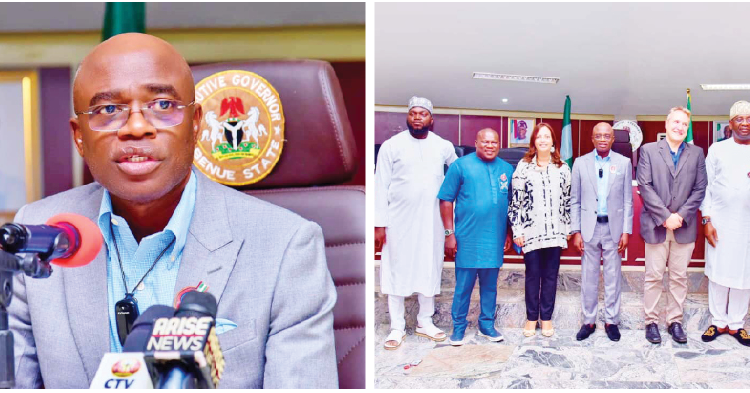It is an incontrovertible fact that Benue State has had its fair share of the sad, unwarranted conflicts in Nigeria with all its attendant consequences on the citizenry and the ecosystem. The latest of such conflict from December 29, 2024 to date has affected over 1,000 households.
Since 2018, over 1.5 million individuals in the state have been compelled to abandon their homes due to communal conflicts, often stemming from competition over scarce natural resources, and exacerbated by environmental adversities such as flooding, fires, and droughts.
The June 2024 Displacement Tracking Matrix of the International Organisation for Migration, IOM, indicates that Benue state is sheltering 500,182 displaced persons, about 38% of the displaced population in the North Central region. These individuals are dispersed across 26 camps and 185 communities, enduring conditions that are far from ideal.
They are grappling with inadequate shelter, limited access to clean water and sanitation, insufficient healthcare services, and a lack of robust protection mechanisms. Such hardships have precipitated detrimental coping strategies, including early marriages, transactional activities, and reduced food intake, disproportionately affecting women, children, and persons with disabilities.
These conditions have pushed the administration of Governor Hyacinth Alia to galvanise interventions, support and linkages to emeliorate the hardships of the displaced persons, enhance security and tap from local and international organisations’ expertise in addressing the humanitarian challenges.
It is in this respect that Governor Alia hosted a meeting with the IOM to explore more areas of collaboration to steadfastly address the multifaceted humanitarian challenges that have beset the state.
“It is through such partnerships that we find renewed hope and the strength to forge ahead” in addressing the daunting challenges through collective action and innovative solutions, the governor told the IOM delegation.
Indeed, the administration of Governor Alia has so far displayed uncommon and unwavering dedication to addressing the root causes of the displacements and fostering sustainable solutions for the citizens. Part of its efforts include the allocation of 70 hectares of land, and facilitating the construction of shelters, thus restoring dignity to 5,600 displaced households. This achievement was realised through the invaluable collaboration with partners like IOM and USAID – BHA.
Alia reeled out other interventions saying, “We have enrolled over 6,273 vulnerable individuals from 15 IDP Camps into the Benue State Health Insurance Scheme, ensuring they receive essential healthcare services that are vital for their well-being.
“Our administration is committed to fostering harmonious coexistence between host communities and IDPs. We have empowered host communities with resources and social services to alleviate any strains arising from the influx of displaced populations.
“To bolster safety for both IDPs and host communities, we have deployed over 5,000 Civil Protection Guards working with the Nigerian security agencies providing a critical layer of security against potential threats.
“Recognizing education as a fundamental right, we have ensured that displaced children and youth have access to ongoing learning programmes within the camps. We acknowledge the need for further improvement and are dedicated to expanding these efforts. We must acknowledge partners like UNICEF, WHO, USAID, PLAN International and Save the Children International in this regard.”
A more fundamental solution to the conflict can be found in agriculture, the cornerstone of Benue state’s economy. It remains pivotal to all efforts to rebuild and empower the displaced population in the state, and this, has not been lost on the government as it partners stakeholders in providing displaced persons and host communities with agricultural inputs, training, and resources to resume full farming activities, to not only ensure food security but also foster economic independence and stability.
“We are promoting sustainable and climate-resilient farming techniques to mitigate the impacts of environmental challenges. By adopting these practices, farmers can achieve better yields and contribute to the state’s overall food production.
“Efforts are underway to improve access to markets for agricultural produce, ensuring that farmers receive fair value for their labour. This includes developing infrastructure and facilitating connections between farmers and buyers,” Alia said.
Although the government has made significant strides in that regard, the enormity of the crisis necessitates sustained and coordinated efforts. This much was acknowledged by the governor during the meeting when he sought for more support.
“We earnestly call upon IOM, ECHO, and all stakeholders to deepen your engagement with us. Specific areas where your support would be invaluable include, Upgrading facilities and constructing emergency shelters to provide safe and dignified living conditions, providing water and sanitation facilities to existing displaced population and new arrivals, ensure that those in the camps are safe and provided with comprehensive support, and expanding access to comprehensive health services, including mental health support and continuous assessment and supporting of GBV cases as they rise.
“Also enhancing programmes that provide agricultural inputs, training, and market access to boost food security and livelihoods, ensuring uninterrupted access to quality education for displaced children and youth, and strengthening safeguards for vulnerable groups, particularly women, children, and persons with disabilities.”
The vision of the government is unequivocal. It aspires to continue to provide basic service to affected population while working tirelessly to reach durable solution with a future where the term “IDP camp” is relegated to history. “I look forward to the day when we can visit our communities, share meals with our citizens in their own homes, and recount how, together, we overcame adversity,” said the governor.
This is indeed achievable with the unwavering support of partners like IOM and ECHO, and the resilience and determination of the government and people of Benue State to transform the narrative from displacement to restoration, development, and hope. There’s no doubt that even in the face of formidable challenges, solidarity and partnership illuminate the path to a brighter future.
– Tikyaa is the Principal Special Assistant to the Governor on Media, Publicity and Communications Strategy





